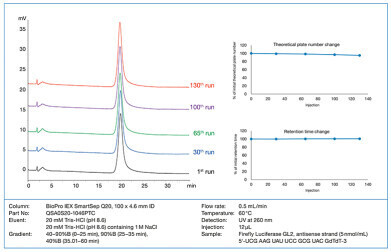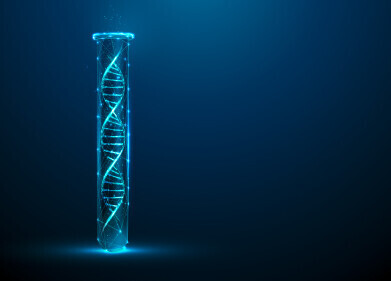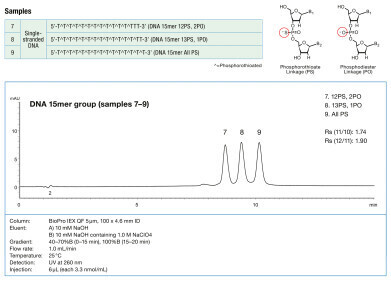-
 The Benefit of High Temperatures in Oligonucleotide Purification
The Benefit of High Temperatures in Oligonucleotide Purification -
 Purification of Oligonucleotides via Anion Exchange Chromatography
Purification of Oligonucleotides via Anion Exchange Chromatography
Liquid chromatography
Purification of Oligonucleotides via Anion Exchange Chromatography
May 21 2024
Oligonucleotides are highly important biopharmaceuticals with strongly increasing relevance. Due to their physico-chemical properties, oligonucleotides can be easily separated and purified using ion exchange chromatography (IEX). However, they often differ in both length and possible modifications. Therefore, IEX resins must meet certain requirements to successfully separate different types of oligonucleotides.
YMC’s BioPro IEX SmartSep resins meet these requirements. They enable efficient oligonucleotide purifications – even single nucleotide differences can be separated. The different particle sizes of 10, 20 and 30 μm allow full flexibility and high resolution. This simplifies method development enormously. BioPro IEX SmartSep is the first choice for successful oligonucleotide purification.
High Resolution Separation of Highly Similar Oligonucleotides with BioPro IEX
The separation of oligonucleotides of different length is one of the biggest challenges in purification. These shortmers (N-1) and longmers (N+1), which differ by one nucleotide unit, are typical impurities that must be removed within a purification process. BioPro IEX easily achieves the separation for different types of oligonucleotides, like DNA, RNA and 2’OMe-RNA with single nucleotide differences.
Smaller particles such as 10 μm provide the required resolution and thus enable highly efficient separations. For larger scale purifications, larger resin beads such as 20 μm or even 30 μm are a better choice as they result in lower backpressures. With BioPro IEX SmartSep, the optimal bead size can be determined for every purification process. The different resins are fully scalable so analytical separation can easily be transferred to the larger particle sizes and vice versa, without changing the retention profile.
High Resolution Separation of PS and PO-Modified Oligonucleotides
But it is not just the length of the oligonucleotides and the associated diverse modifications that pose a challenge. Another demanding task in oligonucleotide purification is the separation of thiolated oligonucleotides with a phosphorothioate bond (PS) from phosphodiester oligonucleotides (PO). Thiolation is a common modification to increase the stability of the molecule and preparative separation from the phosphodiester species is extremely important. With BioPro IEX the separation of three oligos with different degrees of thiolation is possible.
The Benefit of High Temperatures in Oligonucleotide Purification
Increasing temperature is a highly effective tool for optimising the purification of oligonucleotides. By increasing the temperature, for example from 25 to 60 °C narrower peaks and improved resolution can be obtained, especially for strong-binding oligonucleotides. This is only possible with resins that are long-term stable even at elevated temperatures. At 60 °C, the elution profile of an antisense oligonucleotide remains constant even after 130 runs.
BioPro IEX SmartSep Q20 provides reproducible retention time and column efficiency even at high temperatures.
Conclusion
Purification of oligonucleotides requires high resolution separations that efficiently remove very similar impurities from the feed. AEX is a well-established technique for meeting these high demands. YMC’s BioPro IEX SmartSep resins are ideal for the highly productive purification of various types of oligonucleotides. For more information have a look at our new Application Note or contact us directly.
Events
Apr 22 2025 Kintex, South Korea
Analytica Anacon India & IndiaLabExpo
Apr 23 2025 Mumbai, India
Apr 27 2025 Portland, OR, USA
May 11 2025 Vienna, Austria
May 18 2025 Tempe. AZ, USA

















